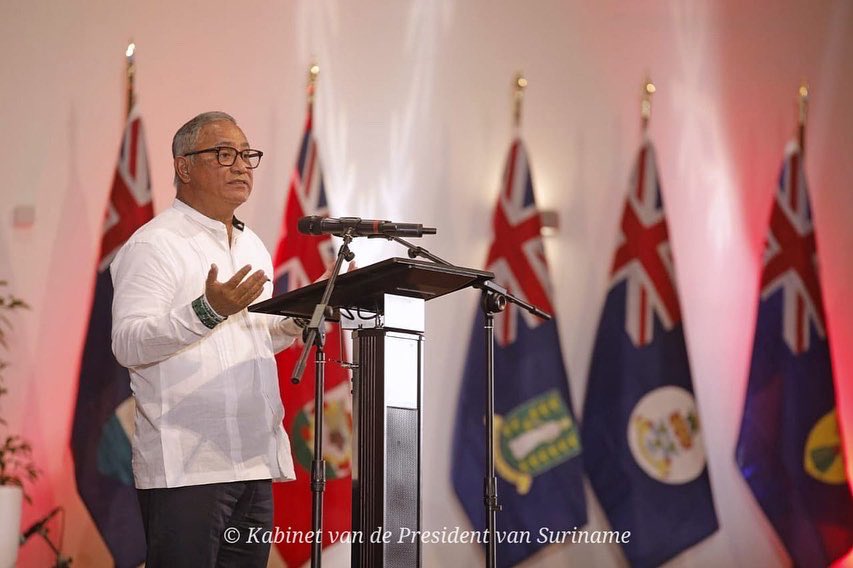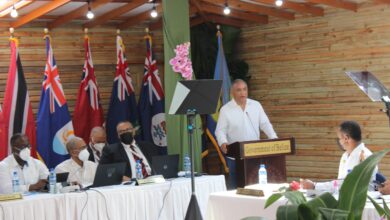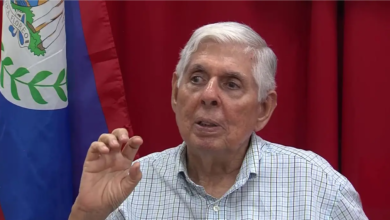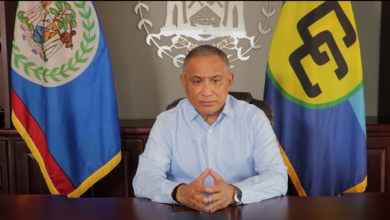- Distinguished Colleague Heads,
- Secretary-General of CARICOM,
- Distinguished Ministers
- Secretary General of the OACPS
- Heads of all of regional institutions
- Members of the Diplomatic Corp
- Ladies and Gentlemen
It is my honour to be here in Paramaribo, on the southeastern edge of our Caribbean Community for the 43rd Regular Meeting of our Conference.
I wish to record my delegation’s deep appreciation for the wonderful Surinamese hospitality and the excellent arrangements in place for our Meeting.
I also wish to welcome, Hon. Dickon Mitchell, the newly elected Prime Minister of Grenada to his first meeting of the Conference. I am sure that he will bring a fresh perspective to enrich our deliberations.
Excellencies, Ladies and Gentlemen,
When I assumed the Chairmanship of CARICOM last January, we were hopeful that we were approaching the end of the acute phase of the COVID-19 pandemic. All forecasts were that an economic recovery was on the horizon. ECLAC predicted 7.8%
growth for the Caribbean. Travel was resuming, our tourism industries were re-opening; our citizens were returning to work and to school.
Alas, as my Chairmanship expires, COVID-19 continues, climate changes and conflict rages.
Our collective response to the dual emergencies of the climate and the pandemic was shattered on 24th February when Russia invaded Ukraine. The emergent food, energy and financial crises are immediate and direct in their impact on our most vulnerable populations. ECLAC’s forecast for Caribbean economic growth, excluding Guyana, has dropped to 4.7%. Our governments are all grappling with ameliorating the worst impacts of climate, COVID and conflict with our very limited financial resources.
Crisis governance is the new normal.
Excellencies,
The geopolitical landscape continues to be redefined. It took the war in Ukraine for the G7 to promote their Partnership for Global Infrastructure and Investment – a promise of some US$600billion for infrastructure and development in low and middle income countries. This is an alternative to China’s Belt and Road Initiative.
New military establishments are being built in our region. These can become flashpoints. We must continue to strongly advocate for and ensure that the Caribbean remains a Zone of Peace.
It is vital that we ensure that as small developing states we are not sidelined as powerful states and actors recalibrate their priorities and refashion their alliances.
Despite the unprecedented challenges and as we approach our 50th anniversary, I leave the chairmanship optimistic about the future of CARICOM integration.
Optimistic because I have no doubt about our solidarity and unity of purpose. Our Conference is of one mind about the nature and scale of the challenges our region faces. While we do not have unanimity on every single issue, we have been united on the most consequential issues including climate action, access to financing, and equitable access to vaccines. Our engagements are always frank, constructive, and respectful. We should never take this for granted.
I am also optimistic because our Conference has been able to effectively exert strong and influential leadership at the global level. We should be proud. CARICOM’s leadership on climate and on access to finance is well recognised and is starting to bear fruit. We have a standing invitation from the G20 Presidency of Indonesia to participate in their work, which is now extended to Suriname as the Incoming Chair. The IMF’s new Resilience and Sustainability Trust — not without its imperfections— is a direct response to our advocacy. The finalisation of the multidimensional vulnerability index is within sight.
Over the last six months we have had two high level engagements with the United States. We have re-set our relations and refocused our Caribbean – U.S partnership on the critical challenges of climate action, security, energy transition, and access to finance. Last month at the Summit of the Americas, the U.S announced its
Partnership to Address Climate Change (PACC 2030) which aligns with many of our priorities and opens a new chapter in U.S CARICOM relations.
The stage is set for a summit with Canada, a longstanding development partner of ours. With Canada, we must do more.
Our Community has also re-engaged with Central America in full recognition of the inevitability of interregional cooperation owing to our geographic proximity and shared challenges. We must build on this alliance with urgency and purpose.
Later this year we will celebrate the 50th anniversary of diplomatic relations between Cuba and CARICOM countries. This historic milestone calls for a dedicated effort by us to bring an end to the illegal blockade imposed on Cuba which has been in place for 70 years.
I am optimistic because the first steps are being taken for concrete action on improving Community governance. The task of reforming our Community and Secretariat must be urgently completed. I commend the Secretary General for the preliminary ideas — many of which are practical and doable.
In agriculture we are moving rapidly to dismantle barriers to intra-regional agricultural trade and to stimulate the investment needed to strengthen the regional food system. The targets set in our 25 by 25 Plan are within reach. If we can deliver affordable, regionally produced food for our people, it will strengthen their faith in our integration effort.
When we met in Belize, we agreed to take a deliberate approach to industrial development of the region. A sound industrial policy will contribute to building economic resilience, improving competitiveness, attracting investment and unleashing the potential of regional entrepreneurship and MSMEs. In short, bringing to life the CSME for all levels of society so that the benefits of integration can be experienced in the daily lives of our citizens.
Definitive steps are also being taken to accelerate the regional digital transformation through the adoption of action plans for fast-tracking digital transformation, for Girls in ICT Partnership, and for the CARICOM Digital Skills Task Force. We have also finalised the reduction of roaming charges in the Region. While the pandemic has underscored the necessity of digitisation, the recovery is an opportunity to catalyze the digitisation of the economy, government services, and social sectors so that the region is well positioned not just for the future but for the present.
The agricultural revolution, industrial development and the digital agenda are interlinked and will contribute to deepening integration and building economic resilience at a time when the global economy is experiencing fragmentation.
I am optimistic because we are on the right track.
We are in fact converting our words into deeds. But we need to move with haste because the clouds on the horizon continue to darken.
Excellencies, Ladies and Gentlemen,
Geopolitical tensions are driving a realignment of the international order.
We are seeing attempts to forge a global democratic alliance to counter the irreversible movement toward a multipolar world. We are witnessing flagrant violations of international law with impunity. We are experiencing the weaponisation of economic and financial interdependence. We are seeing a counter-intuitive unwillingness to cooperate to protect the global commons.
The war in Ukraine has unleashed an economic war in which our countries are collateral damage. The food crisis, already brewing as a result of climate change, has rapidly worsened. Rising oil and fertilizer prices, inflationary pressures and an interlinked financial crisis combine to dim any hope of a robust economic recovery and threaten the social fabric of our societies.
It is in this context, that we have a duty; an obligation to keep global attention focused on the climate emergency, which is an existential issue for the Caribbean, but also according to the IPCC, a code red for all humanity.
Nothing positive has happened since Glasgow. There have been no new commitments to raise ambition on reducing emissions. There have been no new commitments to deliver finance. No progress on adaptation nor loss and damage.
Increasing temperatures, changing rainfall patterns and more frequent extreme climatic events are decimating agricultural harvests and disrupting food supply chains. Urgent investments and utilisation of agricultural adaptation and mitigation measures including insurance, improved storage, climate resilient crops, adoption of new technologies can contribute to more resilient food systems.
Similarly accelerated transition to renewable and clean energy, the sources of which are varied and abundant in the region are at the centre of the solution to climate change. Energy accounts for over two-thirds of global greenhouse gas emissions. The current energy crisis exposes how much more needs to be done.
And of course, access to development financing is crucial if our states are to finance our recovery and invest in resilience. The finalisation and use of the MVI and the mainstreaming of debt relief instruments are among many readily deployable tools to ensure access to development financing for vulnerable countries.
Excellencies, Ladies and Gentlemen,
Our climate agenda is not in addition to or in competition with the geopolitical crises and priorities. Our climate agenda is a direct response to the food, energy and financial crises.
Let me close by thanking the Secretary General and the Secretariat for their support and guidance over the last six months.
I also wish to thank my colleague Heads for their cooperation, advice, and friendship during my tenure.
And now it is left to turn over the Chairmanship of the Conference to H.E. Chandrikapersad “Chan” Santokhi, the distinguished President of Suriname. Mr President, I wish you a successful term and I offer you my full support.
Thank you.





